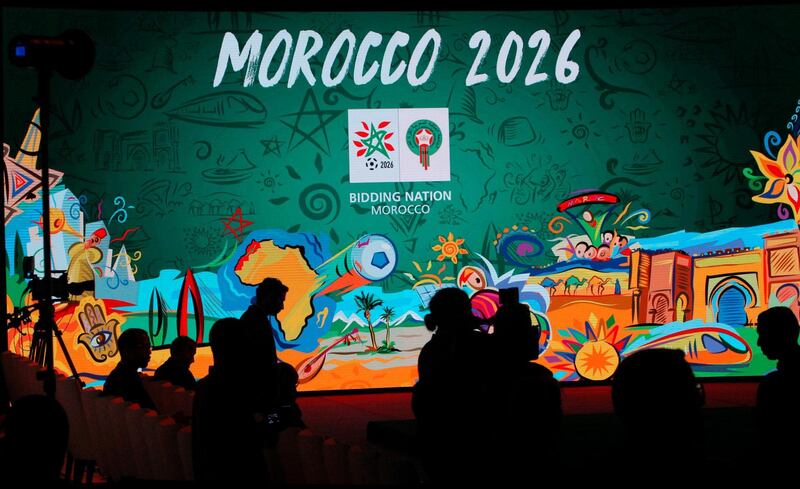Morocco's bid for the 2026 World Cup has been cleared to advance to a runoff vote against a bid from North America despite a Fifa evaluation report classifying the African bid's stadia, accommodation and transport as "high risk."
A long-awaited report from Fifa inspectors left the US-Canada-Mexico bid as the clear front-runner after giving it a rating of four out of a possible five according to its criteria.
Morocco received only 2.7 out of five, but advanced to the June 13 vote in Moscow despite red flags being raised over several critical components of the bid.
A Fifa summary of the bid task force's findings warned that "the amount of new infrastructure required for the Morocco 2026 bid to become reality cannot be overstated."
_____________
Read more
2018 World Cup predictions: Winners, losers, top-scorers and players to watch
In pictures: All 12 Russia 2018 World Cup stadiums
Lowdown: Where to watch 2018 Fifa World Cup matches in Abu Dhabi and kick-off times
Lowdown: Where to watch 2018 Fifa World Cup matches in Dubai and kick-off times
_____________
"The Bid Evaluation Task Force considers it its duty to emphasise the significant overall risk, on a compounded basis, of a bid that has so many facilities (from stadiums and training sites to major transport infrastructure and accommodation projects) that would need to be built or completely renovated," the summary stated.
In 17 of 20 categories rated by Fifa in the report, the North American bid was rated as "low risk". Morocco was deemed low risk in seven categories, with others classified as medium or high risk.
The report's release followed intense speculation Morocco's bid would not be cleared to advance to the Moscow vote on the eve of next month's World Cup.
The North American bid had long been seen as the overwhelming favourite but has faced increasingly stiff competition from Morocco in recent months.
While the North American bid showcases an array of gleaming, large capacity stadia and an established transport and tourism infrastructure, Morocco's bid relies heavily on the country's passion for football, it's relatively compact size and its proximity to Europe.
Africa has only hosted the global showpiece once before, in South Africa in 2010.
#RoadTo2026 🇲🇦
— Morocco 2026 (@Morocco2026_EN) June 1, 2018
Task Force : ✅
On the ballot on June 13 💪#TogetherForOneGoal pic.twitter.com/lkhq8SmQk7
But although the Fifa report leaves Morocco's bid on the ropes, it is not necessarily a knockout blow.
In 2010, a Fifa evaluation committee flagged Qatar's bid for the 2022 World Cup as "a health risk for players, spectators, officials" over the heat in the Gulf state in June and July.
Qatar duly won the vote in a shock result in Zurich; Fifa later moved the tournament to November and December 2022.
The corruption-tainted nature of the 2010 vote, where Russia was awarded the 2018 World Cup, prompted Fifa to overhaul its bidding process for the World Cup.
Whereas previously the 24 members of the Fifa executive committee used to determine World Cup races, now the hosts will be decided by a vote of 207 individual Fifa member nations.
Under the revised bidding rules, designed to weed out substandard bids, the Task Force in theory had the power to dismiss Morocco's bid, which would have left the bid from the United States, Canada and Mexico without a rival in the vote.
The 2026 World Cup will be the first to be expanded to 48 teams, posing a severe test for the hosts.
Fifa president Gianni Infantino is believed to strongly support the North American bid because the three countries involved backed him for the presidency in 2016 when he took over after the reign of Sepp Blatter, who is being investigated in Switzerland for alleged corruption.
#Rabat 📍
— Morocco 2026 (@Morocco2026_EN) June 1, 2018
Rabat's Prince Moulay Abdellah Stadium has already hosted some of world sport's most famous faces, welcoming the African Cup of Nations (1988), the @FIFAcom Club World Cup (2014), and the Diamond League (2016, 2017) in its recent history 🙌#Morocco2026 🇲🇦 pic.twitter.com/aF7EBi8XMw
North America's bid however has been battling to allay concerns that the vote could essentially become a referendum on the popularity of US President Donald Trump, insisting that geopolitics should not be a factor in the race.
In April, Trump appeared to warn that nations who did not support the bid may face political repercussions.
North American bid leaders countered by urging Fifa voters to ignore the "politics of the moment" and have promised to deliver a record US$11 billion (Dh40.3bn) profit.
Morocco has unsuccessfully bid four times before, in 1994, 1998, 2006 and 2010.
Out of a total of 211 Fifa member nations, the four in competition do not have a vote.
Morocco has asked Fifa to bar states with US ties, such as Guam and the British Virgin Islands, from voting.





